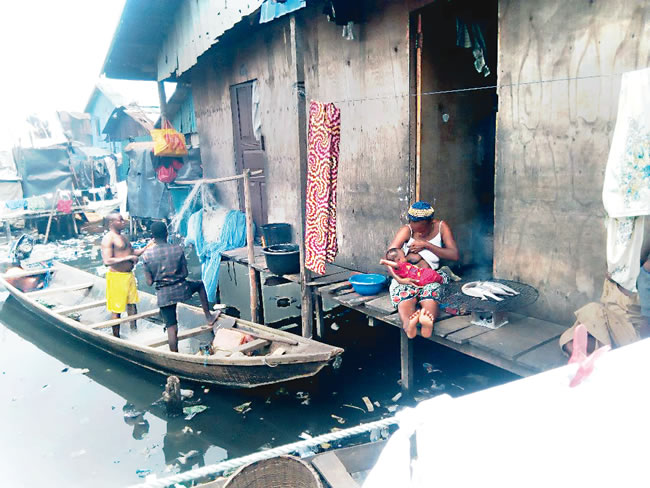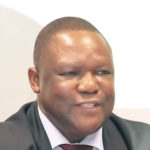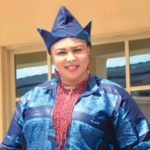DAYO AYEYEMI, in this report, looks at the current state of Makoko, a poverty-stricken community in Lagos.
Apart from being a largely poor community with half the population on water and half on land, the entire environment is filled with foul-smelling water, dungs and dumps. What defines this place were indiscriminate dumping of waste, open defecation, pollution and various other forms of unhygienic living, undoubtedly posing major health challenges to thousands of the inhabitants.
As the third wave of the coronavirus Delta variant grips the world, federal and state authorities in Nigeria are scampering to prevent widespread infection through the reinstatement of preventive protocols. Lagos State, being a major international gateway, is trying to rally its citizenry to obey the re-imposed regulations but one of its communities isn’t bothered whether COVID-19 spreads or not and its inhabitants are past caring due to what they believe is the uncaring attitude of the state government and other stakeholders towards them.
Makoko, a community of about 400,000 residents, seems a case of ‘if the rest of the world won’t remember us, we won’t also listen to the world about coronavirus’. This informal settlement across the Third Mainland Bridge on the coast of mainland Lagos could as well be the dwelling place of coronavirus with the unhidden disregard for prescribed protocols to keep infection away and not getting the next person infected. Here, when Saturday Tribune visited, residents in the crowded community were going about their activities without face mask, without social distancing and without water for washing of hands and without sanitiser.
One of them who has lived about 35 years in the slum even joked that coronavirus had become their next-door neighbor, with interviewed residents saying the living conditions are so bad that coronavirus would rank low among the things bothering them, despite the fact they go out of the community to interact with the rest of the society.
To many of the residents, their problem is not even the ravaging COVID-19 pandemic but the helpless situation in which they have found themselves. In reference to the unhygienic condition of the community, one of the residents who identified herself simply as Princess Odogbo, when interviewed by Saturday Tribune, said, “coronavirus lives here.”
Odogbo, a trader who is in her early 60’s, claimed that she had lived in Makoko for about 35 years. She said the community’s unhealthy environment had remained the same for more than three decades, pointing out that despite the poor living conditions, there were no social amenities provided for the residents by the successive administrations in the state. According to her, there is no provision of pipe-borne water for drinking, much less for the washing of hands, adding that there are no toilets, leaving the residents with no option but to go for open defecation.
During a tour of the community, Saturday Tribune observed that half of the residents in the waterfront community practised open defecation, going by the offensive odour emitting into the atmosphere. Most houses in the slum are on water. They were built from hard wood, supported by stilts driven deep into the waterbed. Each house usually accommodates between six and 10 people.
Findings showed that the waters are five feet deep. Water roams through the settlement like streets in-between houses. These water streets operate as a road system where you can find canoes carrying children to school and people to their places of work. Apart from serving as a means of transportation in the water community, canoes are also used for fishing and act as points of sale, where women sell food, water and household goods.
The main economic activities are salt making, sand dredging, sawmill operation, firewood sale and fishing.
It was also discovered that there is no way each house can build a toilet due to the nature of the terrain except if the state government intervenes by providing them with multiple public toilets.
Apart from the fact that the surrounding water is black in colour, a bad sign for healthy living, the entire community was filthy due to various forms of pollution.
The settlement lacks basic social amenities such as electricity, schools and heath centres. The residents lack sufficient sanitation. Communal latrines are shared by about 15 households and waste water, excreta, kitchen waste and polythene bags go straight into the water. There are two ways to get potable water: the first is to buy from vendors and the second is to fill up plastic jerry cans from large plastic tanks situated at different points in the settlement.
Poverty has saved us from infection –Residents
Even in the squalid condition she has been for decades, Odogbo has not been robbed of her sense of humour. She claimed that coronavirus lives with them but they cannot be infected. “The wastes here are too much. They come with offensive odour. You can see human excreta littering the environment. We have malaria and typhoid fever every time. In fact, coronavirus lives here,” she said.
Asked how many people have been treated for the virus in the community, she said none, noting that they were not afflicted because they are used to dirty environment. She added: “We are not afflicted because we are used to this (dirty) environment. If a stranger or a visitor comes here for the first time, they will be afflicted but we are used to the environment.” She added that the question of observing COVID-19 protocols did not hold water in the area.
She explained that the situation usually becomes particularly bad whenever there is a rise in the sea level which always leads to the entire environment being flooded.
“When water overflows, our houses are always flooded. We have no place to relocate to. The floods always come in September, October and November. We don’t enjoy anything here. We raised the foundation of our houses due to the flood, yet we are always victims. The government should help us,” she said. She appealed to the government to compel the Lagos State Waste Management Authority (LAWMA) to clear the refuse from the entire community, including the waterfront. Besides, she called on the state government to provide them with pipe-borne water, public toilets, drainages, among other infrastructural facilities.
Saturday Tribune gathered that the majority of Makoko inhabitants are Ijaws, Ilajes and Egun.
Another resident, Mrs Mary Jones, who was nursing a baby as of the time of Saturday Tribune’s visit, stated that whenever friends came visiting, they always expressed shock that human beings could be staying here.
“We don’t have the means to relocate to a better community. The government should look into this. Concerning the refuse and sewage here, we want the government, in conjunction with the community, to clear them.
Concerning COVID-19 protocols, Jones said there was nothing like social distancing, considering the density of the community.
“There is nothing like that here. Even when they were distributing palliatives, we got nothing. They (government and non-governmental organisations) didn’t get to the waterfront. Immunisation officials don’t get to the waterfront. If the government wants to help us, they should come here and do a head count and give us palliative care. We are suffering. The government should come here,” she said.
Another resident, Oluwaseun Enikanosebi, said he had been living in Makoko waterfront since 1997. “That is how we roll here,” he said, pointing to a woman and two kids paddling a canoe.
Enikanosebi, who claimed he did not have formal education, called on the state government to help youths in the area in terms of employment. According to him, there are lots of young graduates in Makoko in search of jobs. He called on the government to also provide basic amenities to make life meaningful in the community.
“I came here in 1997. I was a houseman because I had no formal education. I have younger siblings who are going to school. I sponsored them with the proceeds from my job. I and other youths need help from the government. We need soft loans to start small businesses,” he said.
One borehole for 400,000 people?
The Community Development Association’s chairman in the neighborhood, Prince Alade Kulojo, said the community needed social infrastructure. “We need social amenities. We have only one borehole and our drainage is blocked,” he said.
His words contradicted those of earlier speakers when he said there was no issue of Covid in the community. “We don’t have problem of COVID-19 here,” he said, adding that palliatives were given to some underprivileged residents during the lockdown of 2020 with the help of the government and individuals.
A recent report quoted the chief of the village as estimating the population of the community at about 400,000 (both land and water), while a World Bank estimate put those living on land at just a little over 85,000. There has never been an official population count on water because the settlement is considered non-existent and illegal.
‘Slums need greater attention’
Principal Partner, MOA Planners Limited, Mr Moses Ogunleye, a consultant town planner, explained that slums, like human beings, need to be properly fed, cared for and even be provided with drugs.
“In essence, there should be a focus on communities – new, old and very old in order to get them renewed. Let there be a focus on roads, drainage, water supply and sanitation as core issues,” Ogunleye said. He stated that there were developmental plans prepared for slums in Lagos State and called for their implementation.
He said: “Let them be implemented. Slums in the state have the highest population concentration and sohence any attempt at focusing on them is an attempt at impacting the lives of a large number of people. The major slums of Ajegunle, Bariga, Somolu, Agege and others need so much attention.”
When contacted on her mobile phone, the General Manager, Lagos State Urban Renewal Agency, Ms. Ajibike Shomade, requested Saturday Tribune to formally write her before she could speak on the Makoko environmental crisis and if the inhabitants are part of those to enjoy an upgrade already scheduled by the state government.
YOU SHOULD NOT MISS THESE HEADLINES FROM NIGERIAN TRIBUNE
We Have Not Had Water Supply In Months ― Abeokuta Residents
In spite of the huge investment in the water sector by the government and international organisations, water scarcity has grown to become a perennial nightmare for residents of Abeokuta, the Ogun State capital. This report x-rays the lives and experiences of residents in getting clean, potable and affordable water amidst the surge of COVID-19 cases in the state…
Selfies, video calls and Chinese documentaries: The things you’ll meet onboard Lagos-Ibadan train
The Lagos-Ibadan railway was inaugurated recently for a full paid operation by the Nigerian Railway Corporation after about a year of free test-run. Our reporter joined the train to and fro Lagos from Ibadan and tells his experience in this report…
WATCH TOP VIDEOS FROM NIGERIAN TRIBUNE TV
- Let’s Talk About SELF-AWARENESS
- Is Your Confidence Mistaken for Pride? Let’s talk about it
- Is Etiquette About Perfection…Or Just Not Being Rude?
- Top Psychologist Reveal 3 Signs You’re Struggling With Imposter Syndrome
- Do You Pick Up Work-Related Calls at Midnight or Never? Let’s Talk About Boundaries







